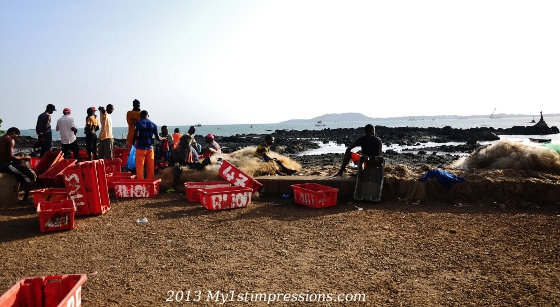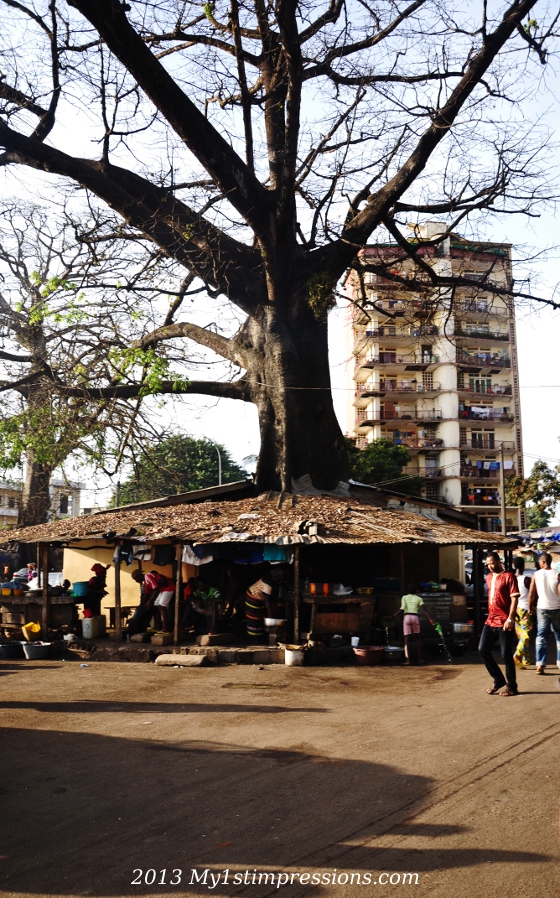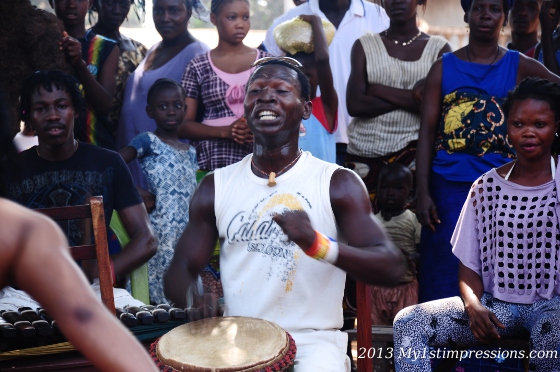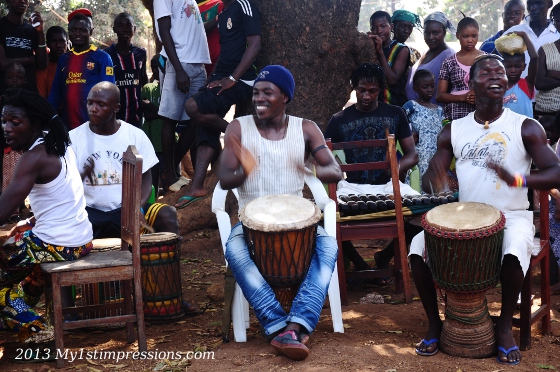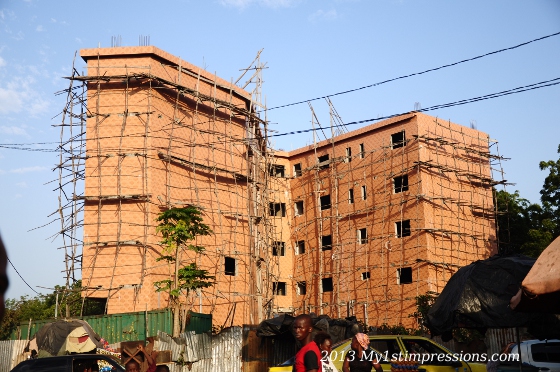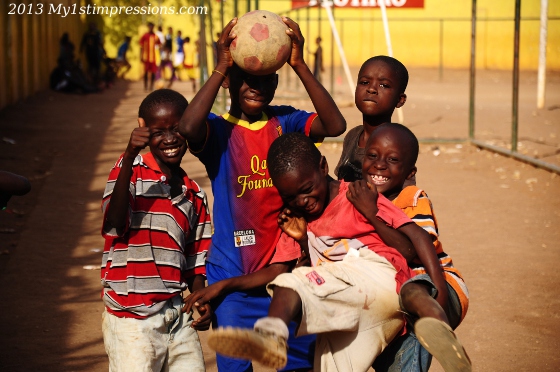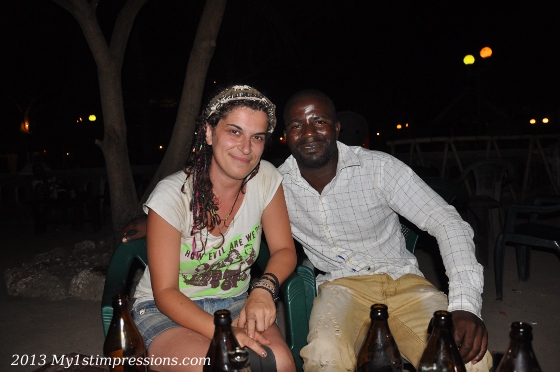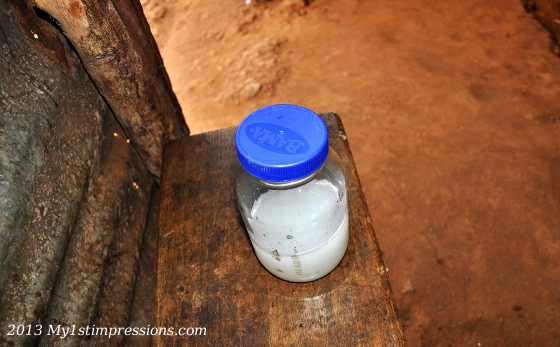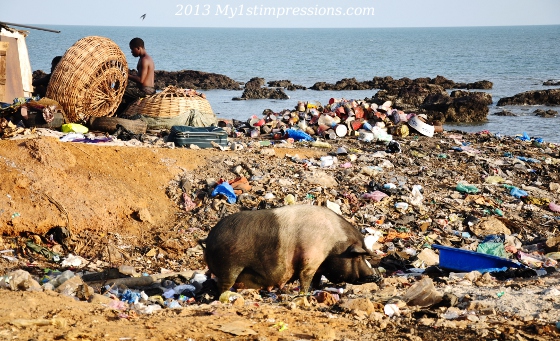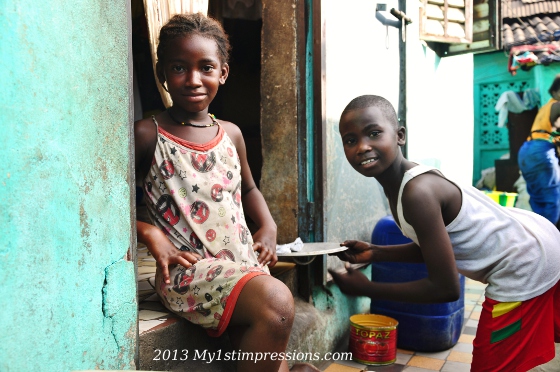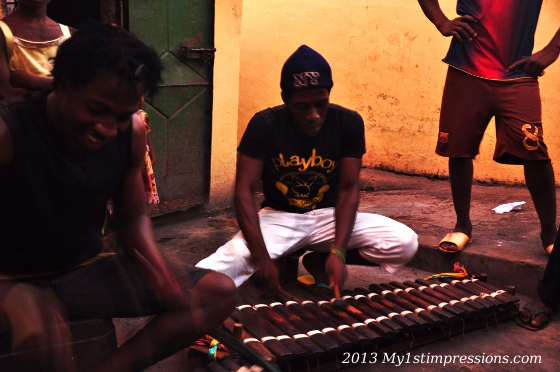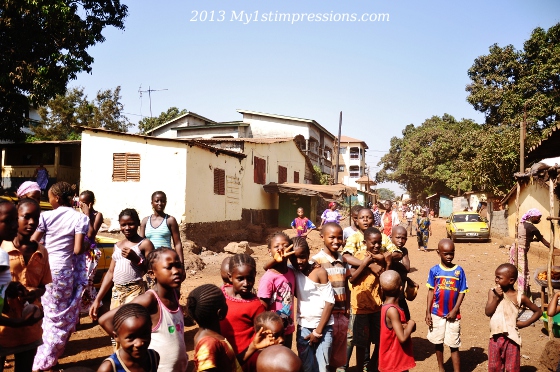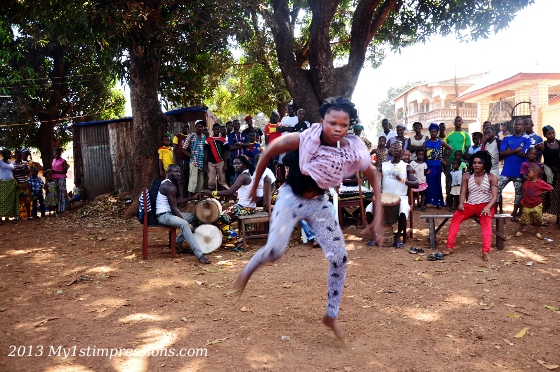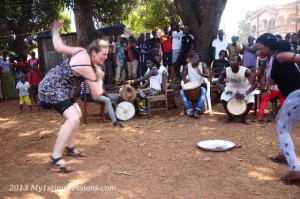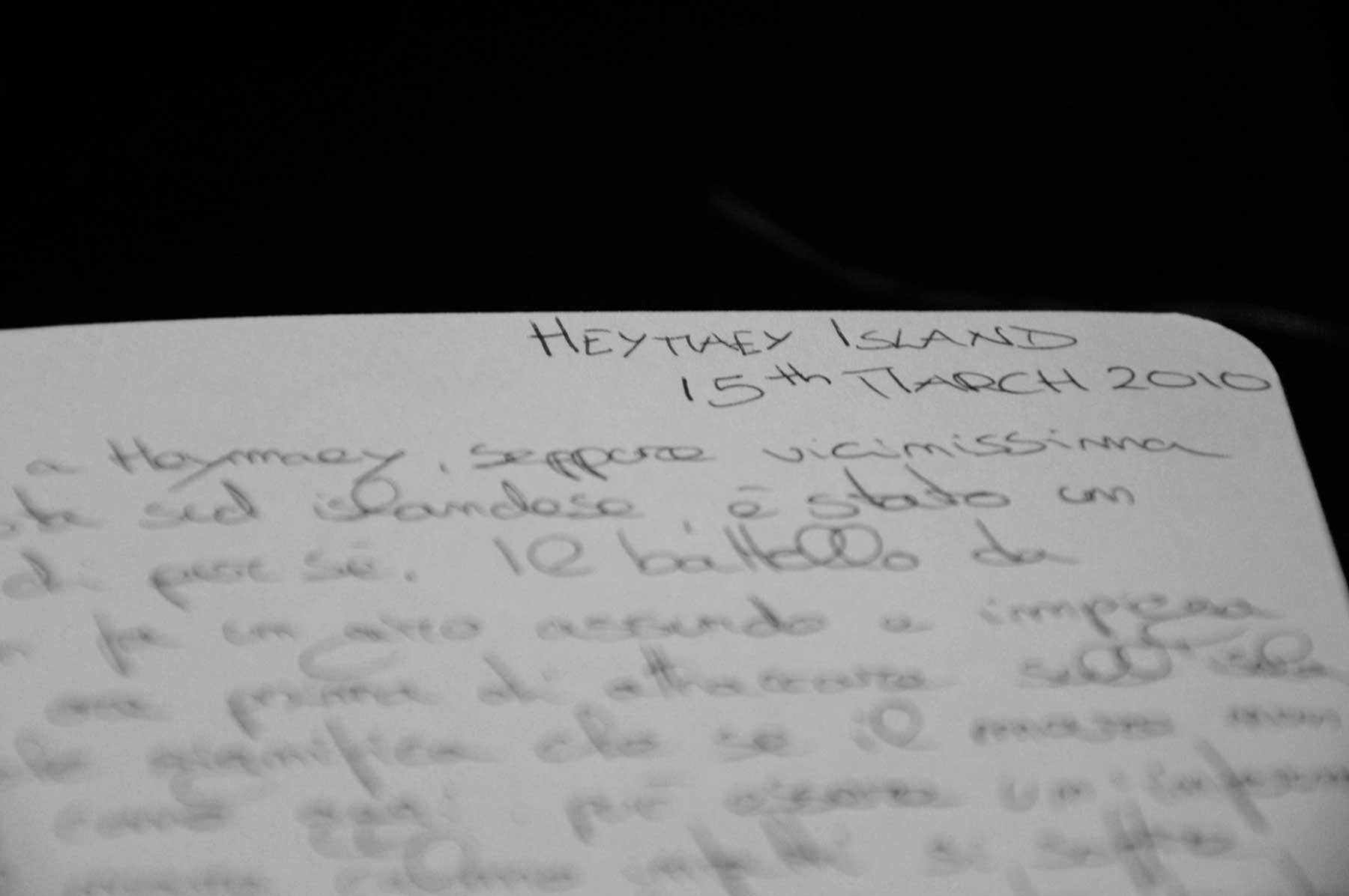Conakry, the capital of Guinea, is so far the most African of all the places seen till now. In order to get to know a bit how everything works you need at least a week, as at the beginning you will be wrapped by its mess and confusion and finding a reason or a rule to this world will look silly at your eyes.
Everything is crazy in Conakry, starting from the way you get there: that’s the 1st impression I got on the first day in town.
The town lays on a long peninsula and it extend in length on it.
There is not a city centre in Conakry. “Downtown” can be anywhere, as the town is made by different suburbs and all of them have a centre. If you ask to a taxi driver to drive you to the centre, you may get “but the center of what?” as an answer.
It took me and my travel mate almost 5 days to get to know how all this works, and only after we finally managed to find a map of the town, which is a mission impossible around here.
Even calling a taxi in the street requires a kind of knowledge of the place, as you need to do different hand signs to the driver according to the direction you are heading to. So it happens that along the streets you see dozens of people doing weird hand signs while waiting for their ride. If you don’t know that, it can take you ages to get the right ride to wherever you want to go to town.
And the drivers in Conakry have a weird and wild way to drive: everytime they see someone crossing the street or before approaching a cross road they start to honk instead of slowing down.
The 1st ride can be scary, especially if you find yourself in a shared taxi together with other 7 people, but after a while you will easily get used to it.
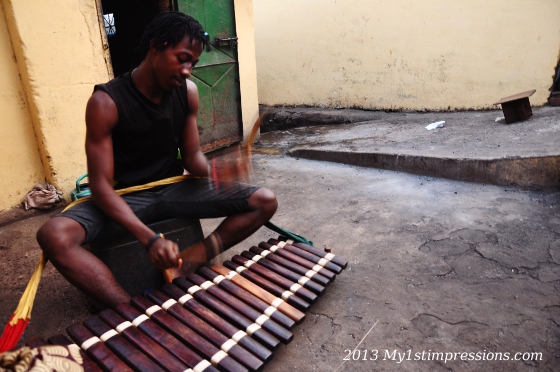 As soon as you arrive in town and you start to know people you will be mesmerized by how quick it will take to you to get a phone number. People here are obsessed with self phones and phone numbers. Everyone will give you his phone number and ask for yours, either the taxi driver, the security guy of the bank where you go to get cash, or even just someone who see you at the market or along the street. And if you give them your phone number, be sure you will get a call, probably after few minutes.
As soon as you arrive in town and you start to know people you will be mesmerized by how quick it will take to you to get a phone number. People here are obsessed with self phones and phone numbers. Everyone will give you his phone number and ask for yours, either the taxi driver, the security guy of the bank where you go to get cash, or even just someone who see you at the market or along the street. And if you give them your phone number, be sure you will get a call, probably after few minutes.
That’s what happened on the first day there. I went to get some cash and while I was at the cash point my friend started to talk with one of the security guys and exchanged the phone number with him. He introduced us to his colleagues, got a chair for us and we all sat outside the bank chatting for a while. When we left, Panucci, that’s the name of the guy, called us in less than 5 minutes, and so it was for the whole week. He introduced us to his friends, we went to his house and met his family, and together with him we finally started to discover the town and give it a sense. Panucci showed us a great bar on the beach where in the weekend there are amazing bands playing traditional music. The traditional music here is great, full of rhythm and vibes and watching a concert is usually a great show as the people have a strange habit to throw notes to the musician while they are playing. They do it all the time, else they go on the stage and stick the money on the forehead of the drummers. Under the stage there is usually a empty space left for the people of the public or sometimes for the same musicians to dance and perform.
It’s something crazy, like the whole town, but it’s impossible not to get involved.
One day we went to another suburb of the town, on the top of a hill where some of Panucci’s friends leaves. They also have a band and they played drums for us for the entire afternoon. Soon the whole neighbourhood arrived and one by one they all started to dance, even the old ladies. When we decided to go, the drummers suddenly stopped the music and left with us, so in few minutes, while we were walking, we turned back and we saw the whole neighbourhood following us, especially children. We went to the drummers house and sat there for a bit, and all the children were outside the house looking at us and smiling. I told them Bonjour and got a choir of Bonjours by all of them. They were simply fantastic!
The atmosphere in town is lazy during the day, especially in the hot hours of the afternoon when it’s literally impossible to do anything, even finding the food, while at the sunrise it seems to rise again.
In Coronthie, near the centre, ladies of all ages sit outside their doors and sell or prepare food. The typical food here is meat on a stick, or fried bananas. The fruit is great: mangos, coconut, papayas, melons, avocados and the cola nuts everywhere at the market. You just have to choose and find the one of the day or the one you feel like that day. I got addicted to the banana chips and to a place where they cooked the best chicken in town. It is open air, and a big grill is placed in the middle of the space, with some fire underneath. A guy is in charge of chopping the chicken while some others cook it on the grill. You can get the entire chicken for less than 4 euros, covered by ketchup, a spicy delicious dark powder and lots of mayonnaise. The mayonnaise around here may be full of conservative, as they can easily keep outside the fridge for days, but it is delicious.
At night in Coronthie there are several tiny night clubs and inside them the air conditioning is so high that you cannot stay for longer than a beer before you start to feel cold. In the weekend or late at night these places get full of people who dance everywhere, and than it’s even more impossible to stay inside as there is no air at all.
In Guinea the biggest note they have is 10000 francs, that is the equivalent of 1 euro. When you get some money out, you find your pockets full of rolls of notes, and if you have to pay something you need to organize yourself in advance as you may carry milions of francs in thousands notes.
Not everywhere in town there is electricity, and in the suburbs where there isn’t everything is powered by generators. It can be a nightmare trying to fall asleep at night with a generator on just in the courtyard of your house. In Guinea there is also no running water in mos of the houses, so in order to have a shower or wash anything you may have to use a bucket of water and hope they don’t take out the water, as it happens especially during the peak hours of the day.
Compared to Senegal and its capital Dakar, Conakry is much simpler and spoiled but after the first rough welcome it becomes smoother and friendly, enriched by its people, that are quiet and not harassing as sometimes the Senegales can be with the foreigners. The feeling I got in town was that I was being treated good. Even in the shops or at the stands of the market, people are honest and charge you the same price of the locals.
Conakry is its people and their smile, its beautiful children, its music, the rhythm of the drums, the delicious street food you find everywhere and the grace of the women selling it, the good vibes of its atmosphere despite the fact is not beautiful or characteristic.
It’s a joyful and disorganized mess, and because of this it’s one of those places you either love it or you hate it forever. Like everything about and in Africa, all you need is to take your time and accept the one of Africa…ten you will love it forever!
Conakry, la capitale della Guinea, è stata il posto più africano visto finora. Se si vuole capire in minima parte come funzionano le cose a Conakry bisogna dedicarci almeno una settimana, in quanto all’inizio si sarà avvolti e sopraffatti dal suo caos e dalla sua confusione, tanto che trovarne una regola sembrerà inutile persino ai propri occhi.
Tutto è “da matti” in Conakry, ad iniziare dal modo in cui ci sia arriva: questa è stata la mia prima impressione il primo giorno.
La città giace su una lunga penisola e si estende in tutta la sua lunghezza. Non c’è un centro in città. Il centro può essere ovunque, perché la città è fatta di diversi quartieri, ognuno dei quali con un suo centro. Può capitare di chiedere al tassista di portarti in centro e di sentirsi rispondere: “Ma il centro di che?”.
Io e il mio compagno di viaggio per i giornia Conakry ci abbiamo messo almeno 5 giorni per capire come funzionasse e solo dopo essere riusciti anche a trovare una piantina della città, cosa che da queste parti si può rivelare una missione impossibile.
Persino chiamare un taxi per strada richiede una conoscenza almeno superflua della città, in quanto per ogni destinazione ci sono segni diversi da fare con le mani. Per strada si vedono decine di persone che fanno sempre segni strani quando aspettano un passaggio. E come si può immaginare se non si sa questa cosa si può impiegare un secolo prima di arrivare in città. Gli autisti poi hanno uno modo strano e per certi versi selvaggio di guidare: ogni volta che vedono qualcuno attraversare la strada o quando stanno per avvicinarsi ad un incrocio iniziano a suonare il clacson ininterrottamente invece di rallentare. Il primo taxi può far quasi spavento, specialmente se lo si condivide con altre 7 persone come è successo a me, ma dopo un po’ ci si abitua anche a questo.
Per il resto, appena si arriva in città e si comincia ad incontrare la gente del posto è quasi scioccante constatare la velocità con cui ci si procurerà, anche senza volerlo, il numero di telefono di qualcuno. La gente da queste parti è ossessionata con i telefonini ed i numeri di telefono. Tutti, ma proprio tutti, tenteranno di darti il loro numero di telefono e ti chiederanno il tuo, che sia il tassista, il ragazzo della security della banca dove si va a prelevare o persino semplicemente qualcuno che ti vede per strada o al mercato. E se gli dai il tuo numero di telefono puoi star pur certo che dopo cinque minuti ti chiamano! Questo e’ ciò che è successo a noi il primo giorno. Mentre io andavo al bancomat, il mio amico ha iniziato a chiacchierare con i tipi della security là davanti e ovviamente si sono scambiati il numero di telefono. Così dopo neanche cinque minuti, il tipo ha preso una sedia per noi e ci siamo tutti seduti davanti alla banca a chiacchierare. Quando ce ne siamo andati, Panucci, questo é il nome del tipo, ci ha telefonato in meno di 5 minuti, e così ha fatto per tutta la settimana. Ogni giorno Panucci ci ha mostrato un angolo del suo mondo a Conakry, ci ha presentato i suoi amici, siamo andati a casa sua, abbiamo incontrato la sua famiglia e, insieme a lui, abbiamo finalmente dato un senso alla città.
Panucci ci ha mostrato un bar stupendo sulla spiaggia, il Fougu Fougu, Faga Faga, dove ogni weekend delle band locali si esibiscono in concerti di musica tradizionale. La musica tradizionale da queste parti è stupenda, piena di ritmo e vibrazioni e di solito assistere ad un concerto è un grande spettacolo, specie quando le persone iniziano a buttare banconote in faccia ai musicisti mentre questi stanno suonando. Lo fanno sempre, a volte vanno addirittura sul palco e attaccano le banconote alla fronte sudata dei musicisti. Tra la folla invece c’è sempre uno spazio vuoto sotto il palco, lasciato vuoto per il pubblico e a volte per i musicisti stessi che lasciano i loro strumenti e si mettono a ballare. A volte ci sono scene da pazzi, come pazza e’ la città intera, ma dopo un po’ è impossibile non farsi coinvolgere.
Un giorno siamo andati in un nuovo quartiere della città, su una collina da dove si vede il mare e dove alcuni amici di Panucci vivono. Anche loro hanno una band e hanno suonato tamburi, xilofoni e percussioni per l’intero pomeriggio per noi, dopo aveer bevuto un litro di vino di palma, che da queste parti è la loro birra. Immediatamente l’intero vicinato è arrivato ed uno ad uno hanno tutti iniziato a ballare, persino le donne un po’ più anziane.
Quando abbiamo deciso di andare, i ragazzi all’improvviso hanno terminato il concerto e sono venuti con noi a casa loro. Ma mentre camminavamo, quando mi sono girata indietro, ho visto alle mie spalle l’intero vicinato che ci seguiva, soprattutto i bambini, tanti bambini. I ragazzi ci hanno portato a casa loro e ci siamo seduti là davanti per un po’, circondati da almeno 30 bambini allegri e chiassosi. È stato bellissimo quando gli ho detto Bonjour e tutti loro mi hanno risposto con un sonante Bonjour all’unisono. Stupendi!
Di giorno l’atmosfera in città è pigra, specie nelle ore calde e afose del pomeriggio quando è letteralmente impossibile fare qualsiasi cosa, persino trovare da mangiare, mentre al tramonto l’atmosfera si risolleva.
A Coronthie, vicino al centro, donne di ogni età siedono per strade vendendo cibo. Il piatto tipico di strada, oltre al sorriso, sono gli spiedini di carne e le banane fritte. La frutta è però la cosa più deliziosa che si può trovare in giro: mango, cocco, papaia, melone, avocado, ananas e le noci di cola sono ovunque al mercato. Si deve solo scegliere il frutto del giorno! Personalmente sono diventata dipendente dalle banane fritte e da un posto dove si mangia il migliore pollo in città. Il posto è all’aria aperta, dove in un angolo è posta una griglia gigante con del fuoco sotto. Un ragazzo si occupa di fare a pezzi centinaia di polli, mentre altri due lo preparano sulla griglia. Con meno di 4 euro si può prendere l’intero pollo, ricoperto di ketchup, una polverina marrone speziata buonissima e tanta maionese. La maionese da queste parti, forse perché piena di conservanti in modo da poter essere tenuta fuori per giorni, vista la mancanza di elettricità o di frigoriferi, è buonissima.
Di notte a Corothie si possono trovare diversi locali e night clubs con l’aria condizionata così forte dentro che è impossibile rimanerci per più di 10 minuti senza avere addirittura freddo. Nel weekend o a notte tarda questi posti si riempiono di gente del posto che balla ovunque,ed allora è ancora più impossibile rimanerci perché non c’è più aria.
In Guinea la banconota più grande che c’è e’ 10000 franchi, equivalenti a 1 euro! Quando si preleva dai bancomat, ci si ritrova con le tasche o lo zaino strapieno di banconote, e se si deve pagare qualcosa di un po’ più costoso ci si deve organizzare in anticipo perché ci si può ritrovare con “milioni”di franchi in tasca, tutti in migliaia di banconote!
Non sempre e non ovunque in Conakry c’è elettricità, e nei quartieri dove non c’è funziona tutto con i generatori. A volte dormire la notte diventa un incubo se il generatore è proprio nel giardino della casa o dell’hotel dove si sta. In Guinea non c’è neanche acqua corrente dal rubinetto della maggior parte delle case, e per farsi al doccia o per lavare qualsiasi cosa si deve usare un secchio pieno di acqua e sperare che non tolgano l’acqua, come succede nella maggior parte dei casi ogni giorno.
Rispetto al Senegal e alla sua capitale Dakar, Conakry è molto più semplice e spoglia, ma dopo il primo traumatico benvenuto, di solito diventa più docile ed amichevole, arricchita dallo spirito dei suoi abitanti, che sono tranquilli e non aggrediscono come a volte i Senegalesi possono fare con gli stranieri.
La sensazione avuta in questa città e’ stata in generale di essere stata trattata bene. Anche nei negozi o tra le bancarelle, le persone sono oneste e fanno pagare gli stessi soldi della gente locale.
Conakry è la sua gente e il loro sorriso, i suoi bellissimi bambini, la sua musica, il ritmo dei tamburi, il cibo di strada delizioso e ovunque la grazia delle donne che lo vendono, l’atmosfera tranquilla nonostante non sia una città bella o attraente.
È un ammasso gioioso e disorganizzato, e forse per questo è uno di quei posti che o lo si odia o lo si ma per sempre. Come per tutto ciò che riguarda l’Africa, ci si deve abbandonare al tempo, prendersi il proprio e accettare quello dell’Africa…per amarla per sempre!
Add comment
-
 Guadix, a Spanish Hobbiton
An hour away from Granada, hidden between prehistoric karst mountains,( read more...)
Guadix, a Spanish Hobbiton
An hour away from Granada, hidden between prehistoric karst mountains,( read more...) -
 Alicante, Spain with a Nordic vibe
Alicante represents the door to the Southern vibes of Spain.( read more...)
Alicante, Spain with a Nordic vibe
Alicante represents the door to the Southern vibes of Spain.( read more...) -
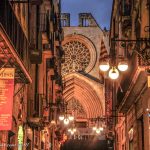 Tarragona, pure magic!
Arriving in Tarragona on the very first night of its( read more...)
Tarragona, pure magic!
Arriving in Tarragona on the very first night of its( read more...) -
 In the sacred woods of La Sagrada Familia
It is truly impossible to describe the feeling I had( read more...)
In the sacred woods of La Sagrada Familia
It is truly impossible to describe the feeling I had( read more...) -
 Venice, just a perfect day
Take a sunny day after the Christmas holidays when tourists( read more...)
Venice, just a perfect day
Take a sunny day after the Christmas holidays when tourists( read more...) -
 Northern Lights:The dance of the Green Spirits
For many years one of the most funny stories about( read more...)
Northern Lights:The dance of the Green Spirits
For many years one of the most funny stories about( read more...)
